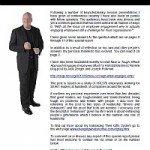 ‘Passion is the Number 1 Business Development Tool’, says my friend Jesper Lowgren, author of On Purpose – the path to extraordinary business transformation. Passion is what drives engagement (both internally and externally) and leads to simplification through asking the right “Why” questions.
‘Passion is the Number 1 Business Development Tool’, says my friend Jesper Lowgren, author of On Purpose – the path to extraordinary business transformation. Passion is what drives engagement (both internally and externally) and leads to simplification through asking the right “Why” questions.
Listen to leading organisations like Zappos and Google and it is clear that people there are passionate about what they do. Yet in too many other organisations passion is a scarce resource. Most people when they start a new job are excited and engaged. Most new projects and change initiatives start out with a lot of enthusiasm. And yet STILL about 2/3 of these initiatives fail – a figure that has not altered significantly in the last 30 years.
Where does all the passion go?
For starters, in no particular order, here is my list of Seven Common Passion Killers in the workplace.
1. People in roles that are wrong for them.
To maintain passion in any role, the role needs to connect with a person’s personal values, their personal strengths and fit their skill level. If the work is too far below their skills level, they will get bored. It it’s too far above their skill level, it will be frustratingly difficult. Training can help equip people with appropriate skills. Personal strengths, on the other hand, are about inborn characteristics which need to be discovered. I use the Talent Dynamics profile test to help people find their own strengths and the kinds of roles they are more likely to find satisfying. The third area: values, is also terribly important. Thanks to people like Simon Sinek, successful businesses are increasingly realising the importance of connecting to their values, their big “Why”. In the same way, individuals are also increasingly realising that in order to be successful they need to connect to their passion and purpose.
2. Lack of clarity about responsibility.
Nothing kills passion more than being micro-managed, and one of the drivers of micro-management is confusion about roles and responsibilities. A passionate worker feels responsible for everything to do with the success of the organisation. A disconnected worker only feels responsible for what is written in their job description and only during their contractual hours. A good example of the differences between these two approaches can be found in my A Tale of Two Airlines. This sense of universal responsibility needs to go with a clarity about the different roles within the team based on an understanding of their different strengths and skills, so that team members themselves can quickly decide who should perform specific tasks. In a dynamically changing environment, not every scenario can be predicted. Over-reliance on written job descriptions and policies and procedures manuals does not give the flexibility and sense of responsibility which keep passion alive.
3. Feedback.
The way that feedback is given in many organisations is a passion-killer. To be effective, feedback needs to be immediate, or as close to immediate as possible, and there should be at least four times as many instances of positive feedback compared to negative feedback. Instead, what often happens is that most feedback is left to the annual (or quarterly) performance review. The exception is negative feedback which is more likely to be immediate. In order to keep people passionate and engaged, there needs to be a switch from catching people doing things wrong, to catching them doing things right.
4. Conformity.
Passionate people are always their authentic selves. It’s hard to imagine anyone being passionate whilst simultaneously being inauthentic. Rob Goffee and Gareth Jones, authors of Why Should Anyone Be Led By You, have found a link between authenticity and leadership. Put simply, people will not be led by someone who they perceive as inauthentic. But the hundreds of executives they surveyed made it clear that in order to be authentic they need to work for an authentic organisation. Too much emphasis on a conformity leads people to feel they have to put on an act rather than show up as their authentic selves.
5. Conflict and/or bullying
Difficult relationships are the number one reason that people leave an organisation or disengage. Conflict is inevitable, but it doesn’t have to poison relationships. Training in conflict management skills can help ensure that relationships remain cordial and that passion is maintained. Properly handled, conflict can even lead to deeper friendship and higher engagement.
6. Unpleasant or distracting working environment
The role of the physical environment on people is often underestimated. Things like noise levels, lighting, airflow and temperature have an obvious impact on comfort. But there are many more subtle ways in which the environment can affect people, including colours, layout, whether people feel they are being observed, zones for quiet focused work and zones for interactions etc.
7. All work and no play
Passionate people celebrate regularly! When the pressure is on to get more done with less resources, it can be tempting not to take time out to celebrate. But that is a mistake. Constant pressure leads to a gradual loss of passion. Regular celebrations of even small wins help maintain and even boost passion, engagement and productivity.
Mike Lowe
Helping individuals and teams get into flow





